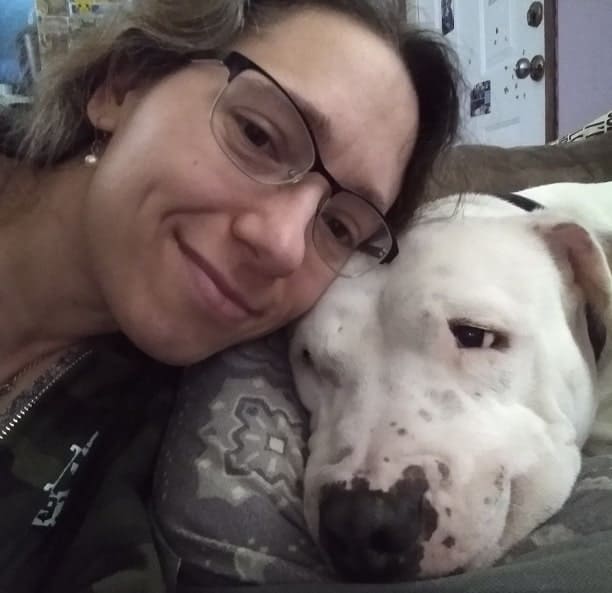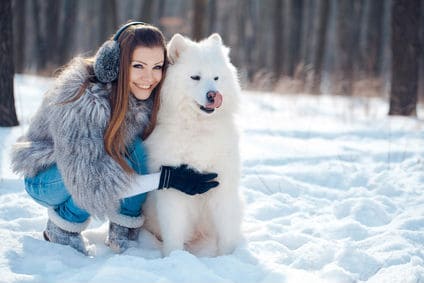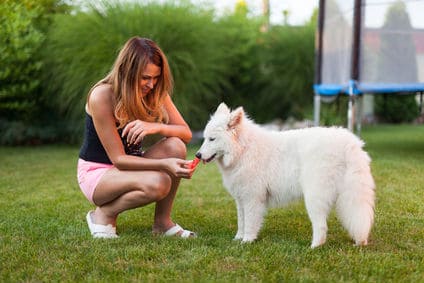Have you fallen in love with the snow-white beauty of the Samoyed coat, and the friendly nature of the Samoyed personality? If so, you’re not alone! Though not the most common dog in the United States, there are many who find this Samoyed temperament and personality irresistible.
What’s to love about a Samoyed?
Yes, Samoyeds are independent, high energy dogs that need a lot of attention, but there is also a lot to love about them!
There is also a lot to love about the Samoyed breed. For one thing:
Friendly Temperament
Unlike other members of the Spitz family, Sammies are not usually aggressive with people or even with other animals – not even cats! Sometimes their herding instincts may kick in, causing them to chase anything that runs, but it is usually all in good fun.
One way to ensure that the friendly Samoyed temperament shines through is to socialize him by taking him to meet new people and play with other dogs.
They love to be with people.
The independent Samoyed temperament doesn’t mean they don’t love to be around people. They have an innate desire to be a contributing member of the family, and they still consider this to be their role. They often pick one person in the family whom they love above all others but will still enjoy time with everyone else.
Playful Temperament
It is unlikely that there will ever be a dull moment with your Sammy around! They love to play and can be quite mischievous to encourage you to interact with them.S
Brief Samoyed History
Like the Alaskan Malamute, the Samoyed is part of the Spitz family.
He comes from an ancient breed of working dogs used in Siberia to hunt and fish in the region’s extreme climate.
They would also pull sleds across the tundra and herd reindeer. Not many dogs can boast such a versatile resume!
Samoyed Health and Life Span
Samoyeds live to be around 12 to 14 years old.
Size
Knowing the size of a normal healthy Samoyed is important to help you notice the early signs of some illness.
Females are usually about 21 inches tall and anywhere from 37.5 to 55 lbs.
Male Samoyeds are slightly bigger at around 21-24 inches tall and max out at about 71 pounds.
Most Samoyed are healthy dogs, but this does not exempt them from possible health problems. Some of the conditions that can develop include:
- Hip dysplasia
- Progressive retinal atrophy (PRA)
- Heart problems
- Diabetes
- Hypothyroidism
Note: if you agree that your health and your dog's health should be a top priority then get a copy of The Ultimate Guide to Dog Health. Your Samoyed friend will love you for it. This guide will help save you money, time and most of all help you keep your dog healthy.
Samoyed Training
Considered to have above-average intelligence, Samoyeds thrive with the right kind of training. If you want the good side of your Samoyed to shine through, taking the time to teach him basic obedience is key.
The Samoyed is incredibly receptive to training. This is due, in part, to his history, snuggled up close with his masters to keep them warm in Arctic climates.
This closeness still pays off today, as the Samoyed is willing to do whatever it takes to please his master. This is definitely not the kind of dog you should leave tied up in the backyard, as he will become despondent and destructive.

Consistent Leadership
While the Samoyed eventually becomes receptive to training, he doesn’t necessarily start out that way. As a somewhat stubborn dog, your Sammy needs to know that you are in charge. You don’t have to bully him around, but you do need to set boundaries and stick to them. This will help keep the independent Samoyed temperament in check.
Remember to be firm but not mean. Let him know that you love him, but that he must listen to you if you are to have a fulfilling relationship with each other.
Short Sessions
As often happens with smarter dogs, Samoyeds are easily bored. Some of the best things you can do are to keep training sessions short and to vary them up. Long, tedious sessions will cause t your Samoyed to tune out and turn off.
Force won’t work
Sammies respond much better to enthusiasm and praise than punishment or force. Praise your Sammie often and with as much excitement as you can muster, and you will have a willing partner who will work hard all day. Using negative reinforcement or force could cause your Samoyed to shut down and exhibit bad behavior.
The Online Dog Trainer by Doggy Dan a world-class Dog Trainer from New Zealand is worth taking a look at. This online resource has hundreds of fun informative dog training videos that can help you learn the basics and more.
Exercise
Working dogs need to work!
There is nothing like inactivity to bring out the worst in your dog.
There is strong evidence to support the fact that exercise makes for a well-behaved dog, especially a working breed like the Samoyed.
Taking your Samoyed for hikes, playing games with him and even going camping with him may help you avoid problems like:
The energetic Samoyed temperament doesn’t make him a bad dog. It just means that you need to spend more time playing and working with him than you would with, say, a Basset Hound.
Grooming
The Samoyed has a double coat, so they tend to shed regularly. They also have shedding seasons once or twice a year, during which they lose even more hair.
Brush your Samoyed daily to remove the dirt and loose hair from his coat. Be sure to look for and work out any mats or tangles.
As far as Samoyed colors go, they are a light-colored breed, with coats ranging only from white to white & biscuit and cream.
Hypoallergenic
Known affectionately as “Sammies” the Samoyed is a hypoallergenic dog so they are a good choice for people who can’t have other breeds in their home due to allergies.
However, it is important to note that no dog is completely hypoallergenic. The only way to know if you’re allergic is to spend time with the dog you’re interested in.
Top Samoyed Mixes
If you thought the Samoyed was cute, just wait until you get a load of the mixed breeds out there that include the Samoyed.
For instance, there’s the Golden Sammy, which is a Golden Retriever mix, or the Samusky, which is a Samoyed and a Siberian Husky. There is also the Sammypoo, which is a Samoyed and Poodle mix.
Finding the Perfect Samoyed
If you’re interested in bringing a Samoyed puppy home, you may not know where to start. You can find a Samoyed for sale through a breeder, or you may be able to adopt one from your local rescue or adoption organization.
Normally, you may have better luck saying you’re open to mixed breeds because it is a lot more likely you will find a mixed breed available for adoption than a purebred.
However, there are only three known Samoyed mixed breeds out there, so while you may have better luck, it may be harder to find the breed in general. This is especially true when you consider that the Samoyed is already a rare breed in the U.S. as it is.
Samoyed Puppies for Sale
Despite being rare in the U.S., the average Samoyed price is pretty fair, ranging between $675 and $1,300. In some parts of the U.S., you may pay a bit more, with prices averaging between $600 and $1,500.
Samoyed Adoption and Rescue
While it may be difficult to find a Samoyed up for adoption at your local animal shelter, you can always put your name on the list. That way, when one comes in, you’re the first one they call.
There are many benefits to adopting a dog. For one thing, there are so many animals in shelters that many shelters euthanize healthy dogs because they need the space. You can save one of these dogs from suffering that potential fate by adopting him and bringing him home.
While you may be able to find puppies available for adoption, there is usually more of an abundance of older dogs in shelters. While everyone wants to bring home an adorable, squishy-faced puppy, an older dog comes with his fair share of benefits, too.
For one thing, he has already, more likely than not, had some training. If his former owners didn’t train him, then the shelter probably has in an effort to make him more adoptable.
This means no peeing on the carpet, and no chewing your beloved mementos. When you get him home, he may require some adjusting, but he should be the very example of a well-behaved pet in no time.
Samoyed Breeders
If you’re interested in buying a Samoyed puppy from a breeder, check out the website for The Samoyed Club of America. Here, you can find a list of breeders the website recommends as legitimate breeders you should be able to trust.
Even so, you should still conduct your own research on the breeder before you settle into a purchasing contract. Look the breeder up on social media and see what others have to say in their reviews.
Once you’ve found a breeder that you think may be a good fit, be sure to canvas the breeder’s home thoroughly. Make sure the puppies have enough room to grow without being squished in together and on top of each other.
Make sure the breeder’s home is clean and that it is a safe environment for the dogs to grow up in. The reason for all of this is because if the breeder’s home is less than satisfactory, the dogs may grow up with aggressive tendencies.
This is because, if the breeder doesn’t care about the environment the puppies are growing up, in, then he probably doesn’t care enough to raise them properly. Even worse, he may not be taking them to the doctor, which means you could spend hundreds of dollars on what turns out to be a sick puppy.
Is the Samoyed Temperament and Personality Right for You?
The Samoyed temperament is a true joy, as he is happy and friendly and loves to spend time with his people. However, as with anything else, it’s not all sunshine and roses. You need to be able to put the time in to get the dog you want.

Kailyn has worked as a professional freelance writer since 2012, and during that time she has written about nearly every dog breed imaginable. Her mother loved Collies, and so Kailyn grew up with three of them throughout her childhood – including a blonde one who was half-blind! Now her home belongs to her first official dog, Macho, a Dogo Argentino rescue.


